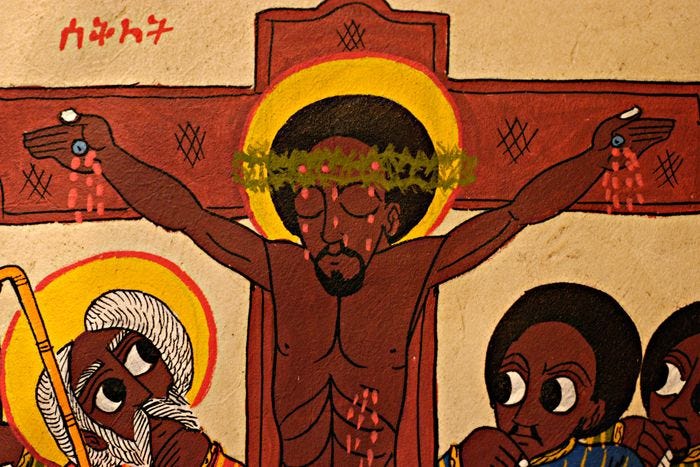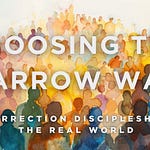Eric Copage, editor of the New York Times Magazine, invited readers in a 2020 essay[i] to close their eyes “and imagine that Jesus is standing in front” of them.
Copage asked, “Is the man kneeling in prayer in the Garden at Gethsemane Chinese? Is the man sitting at the table of the Last Supper Navajo? Is the man dragging his cross toward Golgotha Nigerian? Or is the crucified figure a woman?”
Give it a try.
Close your eyes. Imagine Jesus is standing in front of you.
Is it a bearded man sitting on a throne? A child stuck in the middle of a warzone? A woman ridiculed for demanding peace? Or a person lynched in the American South?
At the beginning of the movie Talladega Nights: The Ballad of Ricky Bobby, Ricky Bobby sits at the head of the dining room table, surrounded by his wife, two sons, father-in-law, and his best friend Cal Naughton, Jr. Not unlike many of you, before the meal begins Ricky offers grace.
“Dear Lord Baby Jesus, or as our brothers in the South call you: 'Hey-suz'. We thank you so much for this bountiful harvest of Dominos, KFC, and the always delicious Taco Bell… Dear Lord Baby Jesus, we also thank you for my wife's father, Chip. We hope that you can use your Baby Jesus powers to heal him and his horrible leg.”
At this point, Ricky’s wife, Carley, interrupts.
“You know, sweetie, Jesus did grow up. You don't always have to call him baby. It's a bit odd and off puttin' to pray to a baby.”
“Well, look, I like the Christmas Jesus best when I'm sayin' grace,” says Ricky. “When you say grace, you can say it to Grown-up Jesus, or Teenage Jesus, or Bearded Jesus, or whoever you want.”
Ricky continues.
“Dear Eight Pound, Six Ounce, Newborn Infant Jesus, don't even know a word yet, just a little infant, so cuddly, but still omnipotent.”
Before long, Cal, Ricky’s best first, chimes in.
“I like to picture Jesus in a Tuxedo T-shirt, 'cause it says, like, 'I wanna be formal, but I'm here to party, too.' I like to party, so I like my Jesus to party... I like to think of Jesus like, with giant eagles' wings and singin' lead vocals for Lynyrd Skynyrd with like an Angel Band, and I'm in the front row.”[ii]
Eight pounds, six ounces, newborn Jesus wearing golden fleece diapers.
Christmas Jesus.
Jesus is wearing a tuxedo t-shirt because he is formal but likes to party.
Jesus singing lead vocals in a southern rock band.
Grown-up Jesus.
Teenage beardless Jesus.
Bearded Jesus.
Acclaimed fictional race car drivers are not the only ones with a preferred version of Jesus. Artists and theologians, since the earliest disciples gathered, have used cultural imagery of Jesus as part of the Church’s tradition.
Joan Taylor, professor of Christianity and Judaism at King’s College, writes, “Early Christian artists appropriated images of the long-haired pagan gods like Zeus to symbolize the power of Jesus.”[iii] The artists, she added, were referring to “other gods the people of that era would know.”
The ways we imagine Jesus and God are as unique as the Church's saints – past, present, and future.
At first glance, Jesus’s parable depicts the talent-distributing master as tough and harsh.
There, as a rich man preparing for a long journey, but before he can leave, he distributes large sums of money among his servants. The distribution of funds was not a gift. Instead, the rich man was entrusting various amounts of wealth to his servants to watch over while the rich man was gone. Matthew tells us the rich man distributed five talents, two talents, and one talent. A talent is the largest currency known in the ancient Near East. We are talking 60 to 75 pounds of silver per talent. So, we could read the parable as a rich man distributing 300 pounds, 120 pounds, and 60 pounds of silver to his servants as he prepared to leave town for a business trip. The man cannot take the talents with him. Imagine trying to check nearly 500 pounds of silver at the Southwest ticketing counter. I do not think bags of that size would fit in the overhead bin.
The first two servants go out; they wheel and deal with the rich man’s money – investing in Bitcoin and Cryptocurrencies – and, before the markets collapse, see a great return on their work.
The third servant buries the 60 pounds of silver in the woods where no one will find it. “Safe and sound underground,” the servant says as they shovel the last bit of dirt. Putting the talent underground, the third servant treats the rich man’s silver as you or I would treat a $20 bill handed to us by a friend when we stick it in our pocket. The third servant acted prudently.
The rich man returns and wants to know how things have gone in his absence.
The first two servants report they each doubled what was given to them. The rich man invites them to “enter into the joy of their master.”
The third servant reports that the rich man’s money is “Safe and sound underground.” “None of the money was wasted,” says the third servant. “I knew you were tough and harsh, so I did not waste any of it. I did not invest in volatile markets. I did not lose anything on online gambling. Here, I will dig your talent up for you.”
The rich man lashes out.
“Tough and harsh?!? I will show you tough and harsh!” the rich man shouts.
“You could have at least purchased a CD at an insured bank. If you had done that, I would have received at least a measly 5.75% increase! Take this worthless servant and throw him into the darkness.”
And Jesus says the kingdom of heaven is somehow wrapped up in this mess.
At first glance, we do not like this parable.
The little guy, it seems, gets clobbered. The rich get richer. The poor get poorer.
We are uneasy with the little guy, clutching his one talent, being thrown into the outer darkness as he declares his fear of the master. “I knew you were tough and harsh, so I hid the silver to protect it!”
The third servant had closed his eyes and imagined an image of his master that would make Steven King’s The Shining look like a children’s book. The harshness of the rich man’s response to the servant is not the parable's point. This is not a do X, Y, and Z to earn your salvation parable. After all, before he began the parable, Jesus said, “The kingdom of heaven is like.”
The kingdom of heaven is like ten bridesmaids, is like a rich man and his talents.
The first two servants acted with great faith, believing that if they did not increase the rich man’s wealth, or worse, lost it all, they would be received with grace and invited into the joy of their master. They imagined God gracefully and joyfully and acted likewise, while the third servant closed his eyes and was filled with fear.
Robert Capon writes, “the sheer needlessness of fear, the utter nonnecessity of our ever having to dread God. The servant with his little shovel and his mousy apprehension that God is as small as himself is such a nerd! He is just one more of the pitiful turkeys that Jesus parades through his parables to shock us, if possible, into recognizing the stupidity of unfaith.”[iv]
[Sermon Image 9] Whether we imagine God as a baby wearing golden fleece diapers, in a tuxedo t-shirt, as a sandal-wearing hippie, a tough and harsh dictator, or full of wrath and seeking revenge, that is the God we get. If we expect God to return, righting creation, making everything new as an eight-pound six-ounce baby, then we are missing the story and thus will miss Christ’s return and the fullness of the kingdom of heaven. Likewise, if we expect the wrath of God to come and be poured out on those we disagree with, we will be sorely disappointed when the pouring of wrath begins on us.
We spend countless hours “creating God in the image of our own fears throughout our lives,” writes Capon. “All the while,” God “is beating us over the head with the balloon of grace and styrofoam baseball bat of a vindictive judgment.”[v]
God, who wants nothing more than to change you from the inside out, is not out to hurt anyone. There are no lengths to which God will not go to prove that the only boundaries between God and us are the fear-filled and golden fleece restrictions we place on the joy of the Lord.
The Good News is this – even when we think we want a wicked and vindictive God – for ourselves and others – we still have Christ Jesus. The One who took the wickedness and vindictive wrath of the world upon himself, and instead of revenge, invites us to experience the joy of God’s grace.
[i] https://www.nytimes.com/2020/04/10/arts/design/jesus-christ-image-easter.html
[ii] https://genius.com/Sony-pictures-talladega-nights-the-ballad-of-ricky-bobby-dear-baby-jesus-annotated#:~:text=%5BRicky%5D%20'Dear%20Tiny%20Jesus,'
[iii] Taylor, Joan. What Did Jesus Look Like? Bloomsbury T&T Clark. 2018.
[iv] Capon, Robert. Kingdom, Grace, and Judgement - Paradox, Outrage, and Vindication in the Parables of Jesus. Eermands. 2002. Pg. 503.
[v] Capon, Pg. 504.




















Share this post